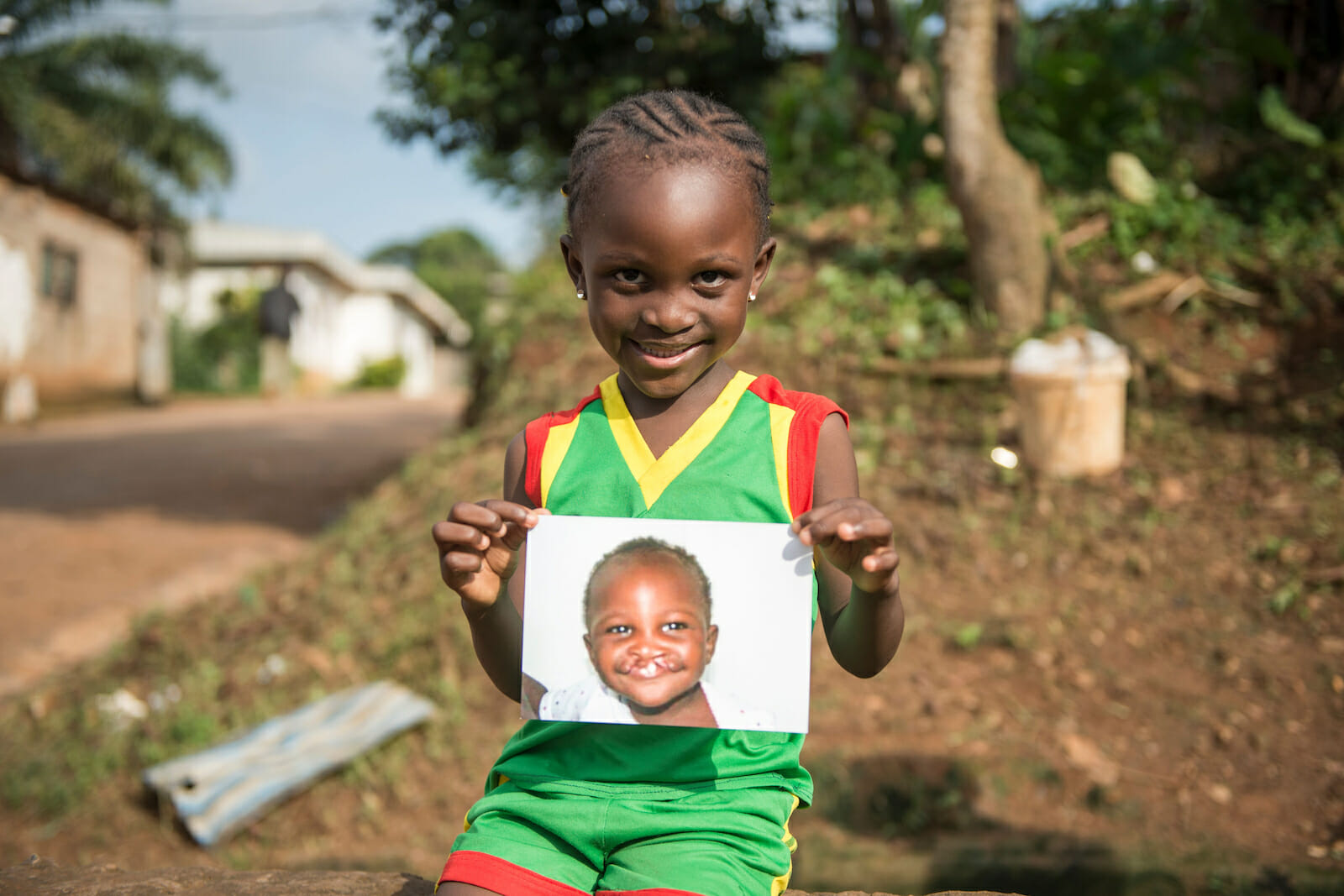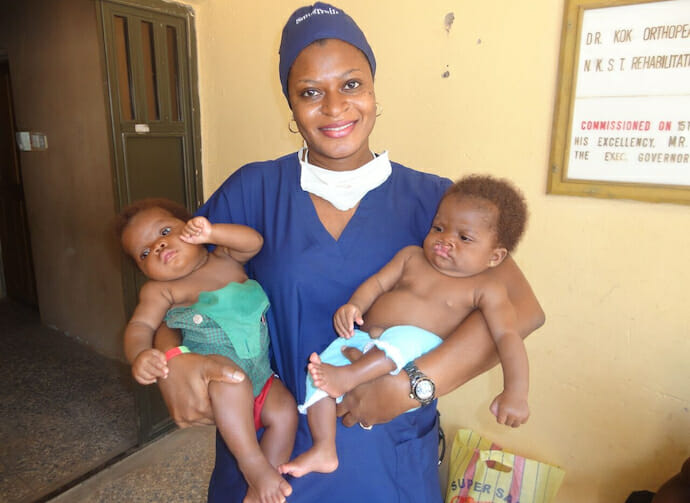
In Nigeria, NGOs Take on Fight Against Cleft Lips
LAGOS, Nigeria – Until 2014 when he met with Smile Train, 15-year-old Joshua suffered from a stigma which pushed him into isolation and away from playing with his peers at school. He was born with a cleft lip. His parents, his mother in particular, attempted to have it treated at the Lagos Island General Hospital but the treatment offered no solution.
Joshua, a young chap who aspires to study Theatre Arts at a university, was left to his fate but he didn’t give up on schooling.
“It was a very painful experience for me,” Joshua said, his voice trembles as he speaks. “But my mother kept on encouraging me in love, she didn’t give up.”
“I used to find it difficult to mingle with my friends during break periods because they make a mockery of me each time I try to play with them,” Joshua recalls. “Now I can mingle anywhere I find myself.”
Each year, more than 200,000 children are born with cleft lips and palates in the world, one in every 500-700 children according to data from the World Health Organization. At least 19,000 children are born with the condition every year in Africa, 12,000 of whom are in West Africa and some 6,000 in Nigeria. Joshua is one of them.
A 2016 study by the Lagos University Teaching Hospital (LUTH), reports that 35.3 percent of respondents believed cleft lip and/or palate was an act of God. Some 5.9 percent believed it was due to an evil spirit and 9.8 percent thought the condition was due to wicked parenting.
The study further revealed that 73 percent of mothers and 59 percent of fathers were ashamed of having a child with a labial or facial cleft.
The patients often live with the stigma, which affects their families as well; many adults with a cleft lip are forced to live in isolation. They are treated like outcasts by neighbors, relatives, and friends.
Prof. Sunday Ajike, member Association of Oral and Maxillofacial Surgeons, says a majority of the cleft patients are killed at birth or live in “self-solitary confinement” due to stigmatization and or the prohibitive cost of treatment coupled with limited resource facilities across Nigeria.

Prof. Mobolanle Ogunlewe, a cleft surgeon at the Lagos University Teaching Hospital, says factors responsible for cleft lips can range from genetic and environmental to a lack of vitamins and self-administration of unprescribed drugs during pregnancy. “In the physiology of cleft, what causes cleft is not fully understood, but it is believed that it is the infracting of several factors, there are the genetic factors and there is what we call the environmental factors.”
“Presently, we cannot do much about the genetic factors but we can do a lot about the environmental factors and these environmental factors are what we call risk factors that can predispose an individual to develop the cleft. And can be as a result of some infections the mother may have during pregnancy,” Dr. Ogunlewe told me in an interview.
However, Nkeiruka Obi, Program Director for West and Central Africa for Smile Train, the NGO which supported Joshua with free surgery, believes Africa still has a huge backlog of adult patients with cleft lips.
Nkeiruka says there’s a need for awareness, education, and ease of accessibility to cleft treatment and genuine commitment of all relevant stakeholders, “this will go a long way in ensuring that no child is left to suffer.” “Also, elevating the expertise of our local partners in becoming self-sufficient and self-sustaining [should] be prioritized.”
Smile Train partners with local hospitals and agencies like Grassroot Smile Initiative, a global sustainable development charity and Caring Family Enhancement Initiative, together with governments that are involved in and support comprehensive cleft care and has supported more than 21,000 cleft surgeries in Nigeria with 83 active partner surgeons and 59 active partner hospitals and 15 comprehensive cleft care teams, including West African College of Surgeons which focuses on building local surgical capacity and training.
The partnerships have more holistic approaches to comprehensive cleft care which includes patient mobilization, nutrition support, cleft surgery, speech therapy, orthodontic care, empowerment initiatives, community sensitization and program awareness. Smile Train was launched in Nigeria in 2007 with exponential growth in activities starting from 2011.
Nkeiruka says the NGOs major priority in cleft care is ensuring the safety of the patient. “In addition to our dedication to safety and quality by offering a multitude of cleft education and training programs and resources, Smile Train is also committed to ensuring that the care we are providing is comprehensive.”
Obi left her career as a banker after 10 years to pursue her passion for philanthropy by founding Sisters Unite for Children, a Nigerian association of professional women to promote the well-being of poor homeless children, and then she joined Smile Train in 2011.
At the top of her list of priorities is deepening Smile Train’s local footprint in Africa to reach more children in need of free cleft treatment. She works directly in local communities to create positive change for children with cleft lips with support for more than 25,000 cleft surgeries. “I have gained the trust of local leaders and developed new partnerships to help educate and generate awareness about cleft and its available treatment,” she says.
“After nearly 10 years of working across West Africa, creating partnerships and a better understanding of cleft lips, Smile Train’s cleft-surgery numbers have improved by 500% under my leadership, and I have helped to start essential comprehensive cleft care programs in several countries in Africa.”
Despite the challenges of inadequate power supply, delays in the passage of legislative reforms particularly on healthcare, lack of an efficient public transportation system and malnutrition, Obi is hungry for more. “Smile Train’s number one priority in cleft care is ensuring the safety of the patient.” “In addition to our dedication to safety and quality by offering a multitude of cleft education and training programs and resources, Smile Train is also committed to ensuring that the care we are providing is comprehensive. We hope to treat at least 5,000 new cases under safe and quality condition and then train at least 20 surgeons, 40 anesthetists/anesthesiologists, 60 nurses, 20 speech therapists, and 15 orthodontists.”

